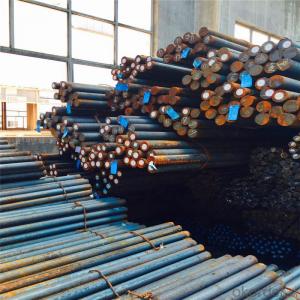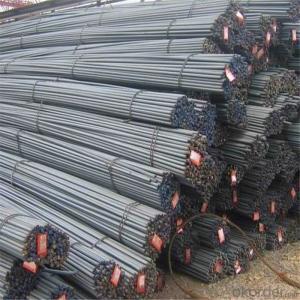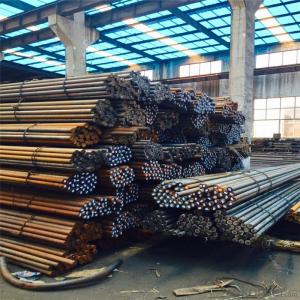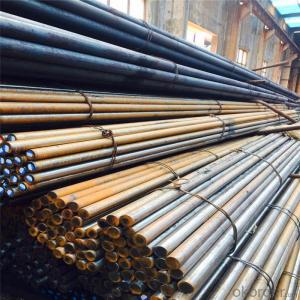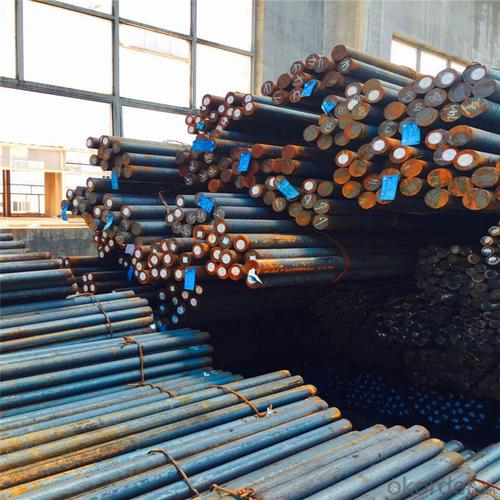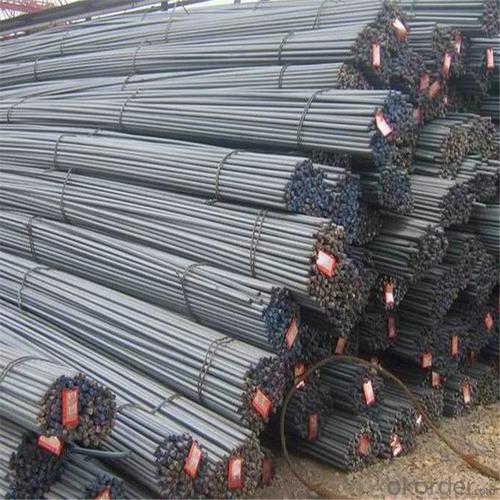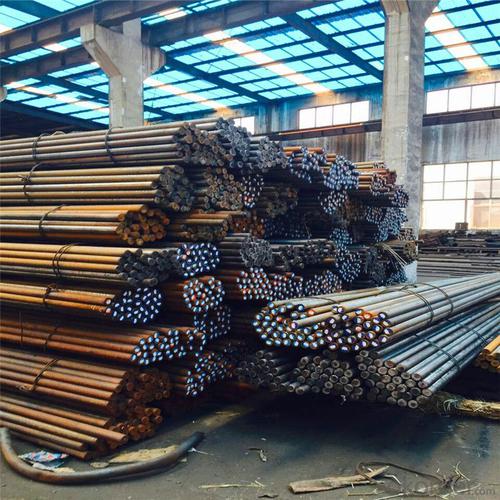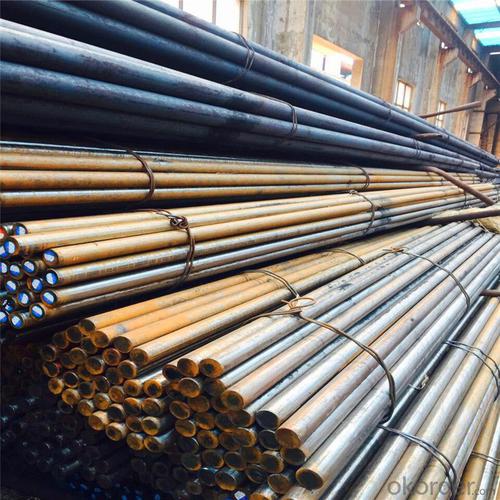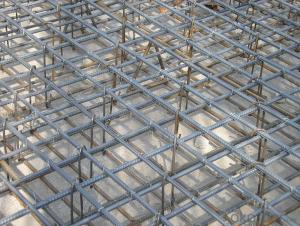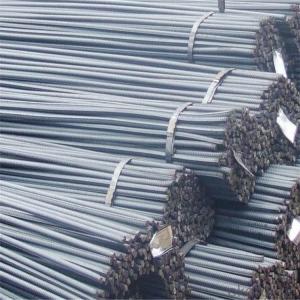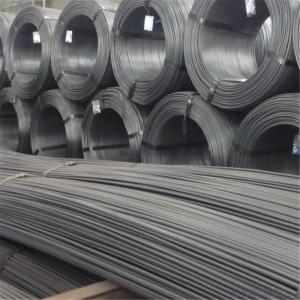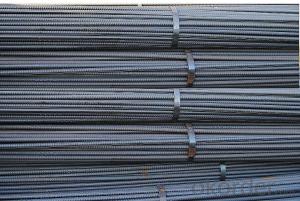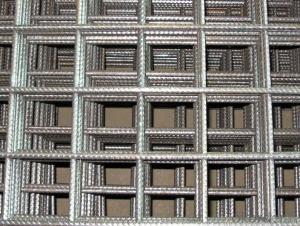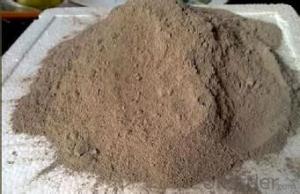ASTM Standard Reinforced Steel D Bar
- Loading Port:
- Tianjin
- Payment Terms:
- TT OR LC
- Min Order Qty:
- 100 m.t.
- Supply Capability:
- 500000 m.t./month
OKorder Service Pledge
OKorder Financial Service
You Might Also Like
Specification
ASTM Standard Reinforced Steel D Bar
Description of ASTM Standard Reinforced Steel D Bar
1, Diameter: 5.5mm-10mm ASTM Standard Reinforced Steel D Bar
10m- 40mm ASTM Standard Reinforced Steel D Bar
2, Length: 6m, 9m, 12m or customized
3, Standard: GB, ASTM, AISI, SAE, DIN, JIS, EN
OEM technology - send detailed technical parameters for accurate quotation.
2, Produce Process: smelt iron - EAF smelt billet - ESR smelt billet -
hot rolled or forged to get the steel round bar and plate
3, Heat Treatment: annealing, normalizing, tempering, quenching
4, Surface Treatment: Black
5, Quality Assurance: We accept third party inspection for all orders.
You can ask testing organizations such as SGS, BV, etc. to test our products before shipping.
Chemical Composition of ASTM Standard Reinforced Steel D Bar
Grade | Technical data of the original chemical composition(%) | |||||
Reinforcing steel bar HRB335 | C | Mn | Si | S | P | B |
≤0.25 | ≤1.60 | ≤0.80 | ≤0.045 | ≤0.045 | >0.0008 | |
Physics Capability | ||||||
Yield Strength(N/cm2) | Tensile Strength(N/cm2) | Elongation(%) | ||||
≥ 335 | ≥490 | ≥16 | ||||
Reinforcing steel bar HRB400 | C | Mn | Si | S | P | B |
≤0.25 | ≤0.16 | ≤0.80 | ≤0.045 | ≤0.045 | 0.04-0.12 | |
Physics Capability | ||||||
Yield Strength(N/cm2) | Tensile Strength(N/cm2) | Elongation(%) | ||||
≥ 400 | ≥ 570 | ≥ 14 | ||||
Products Show of ASTM Standard Reinforced Steel D Bar
Company Information
CNBM International Corporation is the most important trading platform of CNBM group.
Whith its advantages, CNBM International are mainly concentrate on Cement, Glass, Iron and Steel, Ceramics industries and devotes herself for supplying high qulity series of refractories as well as technical consultancies and logistics solutions.


F A Q
1, Your advantages?
professional products inquiry, products knowledge train (for agents), smooth goods delivery, excellent customer solution proposale
2, Test & Certificate?
SGS test is available, customer inspection before shipping is welcome, third party inspection is no problem
3, Factory or Trading Company?
CNBM is a trading company but we have so many protocol factories and CNBM works as a trading department of these factories. Also CNBM is the holding company of many factories.
4, Payment Terms?
30% TT as deposit and 70% before delivery.
Irrevocable L/C at sight.
5, Trading Terms?
EXW, FOB, CIF, FFR, CNF
6, After-sale Service?
CNBM provides the services and support you need for every step of our cooperation. We're the business partner you can trust.
For any problem, please kindly contact us at any your convenient time.
We'll reply you in our first priority within 24 hours.
- Q: Can special steel be used in the defense sector?
- Indeed, in the defense sector, special steel finds itself as a viable option. Special steel, which encompasses alloys or compositions designed with specific attributes such as high strength, hardness, resistance to corrosion, or heat resistance, proves to be suitable for a range of defense applications. These applications include the construction of armored vehicles, naval vessels, aircraft, and weaponry. Within the defense sector, special steel serves as a valuable resource for manufacturing components and structures necessitating exceptional strength and durability. For instance, it can be utilized to produce armor plates for tanks and armored vehicles, which must endure high impact and ballistic threats. Additionally, special steel can be employed in the construction of naval vessels, providing corrosion resistance and enhancing overall structural integrity. Furthermore, the defense industry heavily relies on special steel for manufacturing aircraft parts and weaponry. Aircraft components, such as landing gear, engine parts, and structural elements, demand materials of high strength to ensure safe and reliable operation. Special steel alloys fulfill this requirement by providing the necessary strength and resistance to extreme conditions, including high temperatures and pressures, making them an ideal choice for these applications. Moreover, special steel plays a vital role in the production of various types of weapons, such as firearms and blades. Its exceptional strength and hardness properties render it suitable for manufacturing gun barrels, bulletproof vests, and knives employed by military personnel. To summarize, special steel holds significant value within the defense sector due to its exceptional properties, including strength, hardness, corrosion resistance, and heat resistance. Its extensive applications in the construction of armored vehicles, naval vessels, aircraft, and weaponry ensure the safety, durability, and effectiveness of military equipment.
- Q: What is the impact of grain size on the mechanical properties of special steel?
- The impact of grain size on the mechanical properties of special steel is significant. Generally, a finer grain size enhances the strength, hardness, and toughness of the steel, while a coarser grain size can result in reduced mechanical properties. This is because a finer grain size provides more grain boundaries, which act as barriers to dislocation movement and contribute to strengthening the material. Additionally, finer grains promote better uniformity in the distribution of stress and strain, leading to improved mechanical performance. Therefore, controlling and optimizing the grain size is crucial in achieving the desired mechanical properties of special steel.
- Q: What are the main applications of special steel in the agricultural sector?
- Special steel has various applications in the agricultural sector, including the manufacturing of agricultural machinery and equipment such as tractors, plows, and harvesters. It is also used for constructing storage silos, irrigation systems, and fencing materials. Additionally, special steel is utilized in the fabrication of cutting tools, blades, and parts for farming implements, ensuring durability and high performance in challenging agricultural environments.
- Q: How does special steel perform in high-impact applications?
- Special steel has been specifically designed to excel in high-impact applications, showcasing unique properties that allow it to withstand extreme forces and impacts without deforming or breaking. Notably, one of the standout features of special steel is its exceptional strength and hardness, enabling it to effectively absorb and distribute impact forces. Consequently, this prevents the material from shattering or deforming under heavy loads, rendering it highly suitable for applications such as construction machinery, automotive parts, and industrial equipment. Furthermore, special steel exhibits outstanding toughness, enabling it to resist cracking or fracturing when subjected to sudden and intense impacts. This quality proves crucial in high-impact applications where the material must endure repeated forces without failure. The toughness of special steel is achieved through meticulous alloying and heat treatment processes, which significantly enhance its energy absorption capacity and fracture resistance. Moreover, special steel often possesses superior properties such as wear resistance, corrosion resistance, and heat resistance, all of which contribute to its overall performance in high-impact applications. These heightened characteristics allow the material to maintain its integrity and functionality even when exposed to harsh environments or extreme temperatures. In conclusion, special steel showcases exceptional performance in high-impact applications as a result of its remarkable strength, toughness, wear resistance, corrosion resistance, and heat resistance. These properties establish it as a reliable and durable choice for industries requiring materials capable of withstanding intense forces and impacts.
- Q: Can special steel be used in the oil refinery industry?
- Yes, special steel can be used in the oil refinery industry. Special steel, such as stainless steel or high alloy steel, is often preferred in the oil refinery industry due to its superior corrosion resistance and high temperature strength. It is commonly used in various applications, including piping, tanks, heat exchangers, and valves, to ensure durability and reliability in the harsh and corrosive environment of oil refineries.
- Q: What are the main factors affecting the heat resistance of special steel?
- The heat resistance of special steel is determined by several key factors, including its alloy composition, microstructure, and heat treatment. The addition of specific elements like chromium, nickel, molybdenum, and tungsten can enhance the steel's ability to withstand high temperatures by forming stable oxide layers on its surface, which protect against oxidation and corrosion. The microstructure of special steel also plays a role in its heat resistance. Factors like grain size, phase distribution, and the presence of precipitates can affect the steel's thermal stability. Fine-grained structures and a homogeneous phase distribution improve resistance to creep, while precipitates like carbides or intermetallic compounds strengthen the steel and prevent thermal softening. Heat treatment processes, such as quenching and tempering, have a significant impact on the heat resistance of special steel. Proper heat treatment optimizes the microstructure and enhances mechanical properties, including resistance to thermal degradation. Controlled quenching, for example, promotes the formation of a martensitic structure, which increases hardness and strength at high temperatures. Other factors that influence heat resistance include impurities, surface conditions, and environmental factors. Impurities like sulfur and phosphorus can reduce resistance to high temperatures by promoting brittle phase formation or oxidation. Surface conditions, such as roughness or cracks, can cause localized heating and accelerated degradation. Environmental factors like corrosive gases or high humidity can also promote oxidation or corrosion. In conclusion, the heat resistance of special steel is affected by alloy composition, microstructure, heat treatment, impurities, surface conditions, and environmental factors. Understanding and optimizing these factors are crucial for developing special steel with superior heat resistance for various industrial applications.
- Q: How does special steel contribute to the manufacturing of structural components?
- Special steel plays a crucial role in the manufacturing of structural components due to its unique properties and characteristics. Firstly, special steel offers exceptional strength and durability, making it an ideal material for constructing load-bearing structures. It can withstand high levels of stress, pressure, and heavy loads, ensuring the structural integrity and safety of the components. Furthermore, special steel possesses excellent corrosion resistance, which is particularly important for structural components exposed to harsh environments, such as bridges, offshore platforms, or buildings near the coast. This corrosion resistance helps prevent rusting and deterioration, prolonging the lifespan of the structural components and reducing maintenance costs. Moreover, special steel offers a high degree of versatility in terms of design and fabrication. It can be easily shaped, molded, and welded, allowing manufacturers to create complex and intricate structural components with precision. This flexibility enables the production of customized components that meet specific requirements and specifications, enhancing the overall performance and functionality of the structures. Additionally, special steel exhibits excellent heat resistance and fireproofing properties, making it suitable for components exposed to high temperatures or fire hazards. This is particularly important in the manufacturing of structural components for industrial facilities, power plants, or transportation infrastructure, where fire protection is vital. Furthermore, special steel often has superior fatigue resistance, enabling it to withstand repetitive or cyclic loading without suffering from fatigue failure. This property is crucial for structural components subjected to dynamic or fluctuating loads, such as bridges, cranes, or machinery parts. Overall, special steel greatly contributes to the manufacturing of structural components by providing strength, durability, corrosion resistance, versatility in design, heat resistance, fireproofing, and fatigue resistance. Its unique properties make it an essential material choice for constructing safe, reliable, and long-lasting structures across various industries.
- Q: What are the main advantages of using special steel in the food processing industry?
- The main advantages of using special steel in the food processing industry are its exceptional strength and durability, resistance to corrosion and bacteria growth, and ease of cleaning and maintenance. Special steel is highly resistant to wear and tear, ensuring longevity and reducing the need for frequent replacements. Its corrosion resistance properties prevent contamination and maintain the integrity of food products. Additionally, special steel's smooth surface and non-porous nature make it easy to clean, ensuring optimal hygiene standards in food processing facilities.
- Q: What are the applications of special steel in the manufacturing supply chain?
- Special steel has various applications in the manufacturing supply chain. It is commonly used in industries such as automotive, aerospace, energy, and construction. Special steel's unique properties, including high strength, durability, and resistance to corrosion and wear, make it ideal for manufacturing components and parts that require exceptional performance under demanding conditions. These applications can range from manufacturing engine components, structural parts, tools, and machinery, to oil and gas pipelines, power generation equipment, and building infrastructure. Special steel plays a crucial role in enhancing the overall efficiency, reliability, and safety of the manufacturing supply chain.
- Q: What are the properties of high-strength alloy steel?
- High-strength alloy steel possesses several key properties that make it desirable for various applications. It has excellent tensile strength, allowing it to withstand heavy loads and resist deformation. The steel also exhibits high toughness, making it resistant to fracture even under extreme conditions. Furthermore, it offers exceptional corrosion resistance, ensuring longevity and durability in harsh environments. Additionally, high-strength alloy steel often maintains its properties at elevated temperatures, making it suitable for high-pressure and high-temperature applications.
Send your message to us
ASTM Standard Reinforced Steel D Bar
- Loading Port:
- Tianjin
- Payment Terms:
- TT OR LC
- Min Order Qty:
- 100 m.t.
- Supply Capability:
- 500000 m.t./month
OKorder Service Pledge
OKorder Financial Service
Similar products
Hot products
Hot Searches
Related keywords
